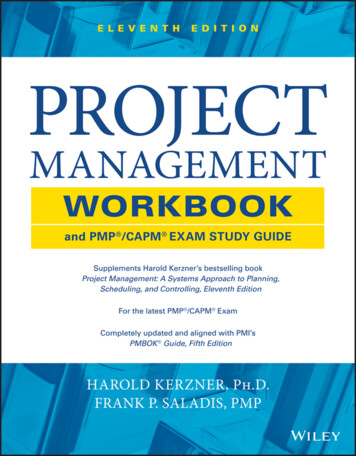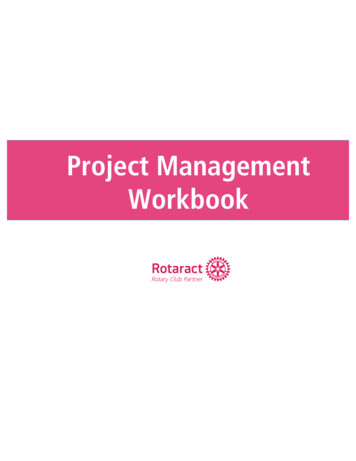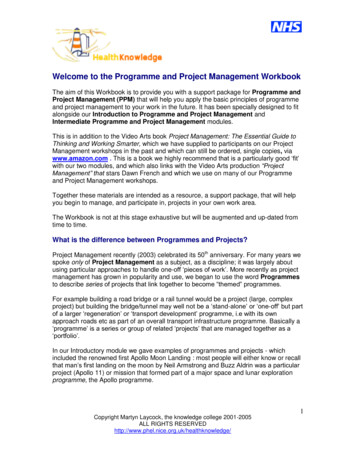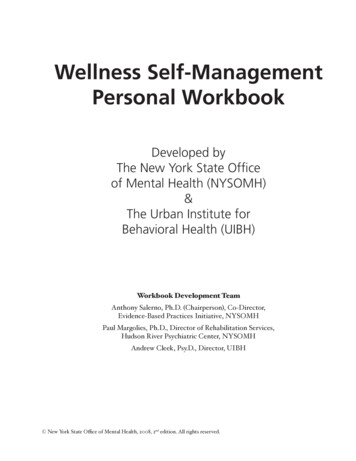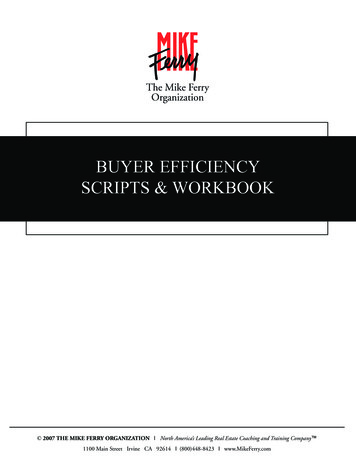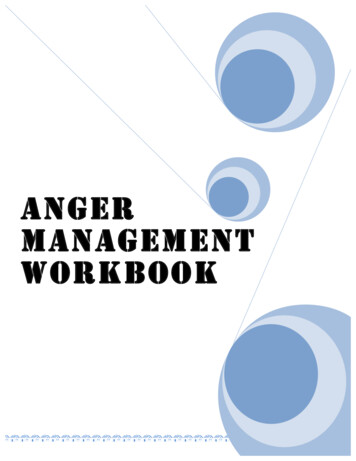
Transcription
ANGERMANAGEMENTWORKBOOK
WHAT CAUSESANGER?The causes vary from person to personand from situation to situation.Anger affects your body.When you get angry, your body createsenergy.Here’s what happens: Adrenaline and other chemicalsenter your bloodstream. Your heart pumps faster. Your blood flows more quickly. Your muscles tense.Everyone gets angry sometimes.Handling anger well can help you: Overcome problems Reach your goals Stay healthy Feel better about yourselfBut too much anger oruncontrolled anger can causeproblems.Examples: Problems in your relationships withfamily and friends Problems at work Legal and financial troubles Physical and mental healthproblemsSome common causes ofanger include:StressStress related to work, family,health and money problems maymake you feel anxious and irritable.FrustrationYou may get angry if you fail toreach a goal or feel as if things areout of your control.FearAnger is a natural response tothreats of violence, or to physical orverbal abuse.AnnoyanceYou may react in anger to minorirritations and daily hassles.DisappointmentAnger often results whenexpectations and desires aren’t met.ResentmentYou may feel angry when you’vebeen hurt, rejected or offended.2
POORLYHANDLEDANGER CANCAUSEMANYPROBLEMS.Some people try to pretend they aren’tangry. Other people feel as if theiranger is out of control. They don’tbelieve they can handle it.DepressionAnger that’s kept bottled up can affectyour thoughts and feelings. You maybegin to feel unhappy and lose interest inthings you used to enjoy, such ashobbies, work, friends or sex.Problems at workIf you blow up on the job, co-workers,supervisors and customers may developa negative impression of you. Yourcareer may suffer as a result.Alcohol or other drug problemsYou may use alcohol or other drugs totry to: Dull anger and other strongfeelings Forget about the negativeconsequences of an angry outburst.But using alcohol or other drugs won’tsolve any problems. And it usuallyresults in more anger and problems.But ignoring anger or givingup control over it can lead to:Physical health problemsThese may include: Headaches Sleep problems Digestive problems High blood pressure Heart problemsPoor decision makingAnger can make it hard to think clearly.You may have trouble concentrating ormay use poor judgment. This can lead tocar crashes, injuries and other problems.Problems with relationshipsIf you can’t control your anger, you mayend up insulting, criticizing orthreatening those close to you. Theymay respond with anger or resentment.Getting angry may also keep you fromtelling your loved ones how you reallyfeel.Low self-esteemIf you have trouble managing anger, youmay feel bad about yourself. You mayfeel as if you have little control overwhat happens.3
WHAT SETS YOU OFF?Different things trigger a person’s anger. Some common triggers are listed below.Check the ones that trigger your anger. Use the blank spaces to fill in your owntriggers.I feel angry when I: Think I am treated unfairlyAm embarrassedFeel ignoredDon’t get credit for something I’vedoneHave to follow ordersFail at something or don’t dosomething wellFeel helpless or out of controlGet jealousI feel angry when people:insult mecriticize me or my workdon’t listen to me disagree with medon’t work as hard as I dolie to metell me what to doare rude or inconsiderateare latedon’t act or feel the way I think theyshould I feel angry when faced with theseevents or situations: Traffic jams and encounters with otherdrivers Conflict at work Family arguments Child misbehavior or temper tantrums Waiting in line at the bank, store, etc. Financial problems Yelling or loud noises Mistakes or errors Wasted time Losing a game or a contest Name-calling or teasing Child abuse Prejudice toward anyone Mistreatment of animals Once you’re aware of things that set you off,you can work to change the way you respondto them.4
KEEP AN “ANGERJOURNAL.”Date andtimeTriggerMy angerwarningsignsMy angerrating1 mild.2 moderate3 severe .What I did inresponseHow I feltafterwardUse these 2 pages to start your journal. Over the nextseveral days keep track of things that trigger your anger.5
BE AWARE OFHIDDEN ANGER.Sometimes what triggers youranger isn’t the only thingcausing angry feelings.What are your warning signs?When you get angry, ask yourself:Are my level of anger and my reactionout of proportion to the trigger?Do you seem to overreact to minorannoyances? Perhaps there is something elseon your mind that’s making you angry.Am I directing my anger at anThink about how you feel when you get angry.innocent person?Check the warning signs you often have whenAre you really angry with the person whoyou get angry. Write in signs that aren’t listed.triggered your feelings? For example, supposeyou have a disagreement with your boss. ItMy warning signs are:bothers you all day, but you say nothing. Tense musclesLater, you let your anger out by blowing up at Tight fistsyour partner or child. Clenched jaw Sweaty palmsAm I taking something personally? Racing heartbeatLearning to deal well with anger means Fast breathinglearning not to take problems or arguments Trembling or feeling shakypersonally. Feeling warm or flushed Upset stomachIs this how I usually respond in Loud or mean voicesimilar situations? You may respond with anger in certain situations because that’s what you’ve always done. You may have learned this behavior growing up. But you can change the way you react. Talk with your health-care provider.Certain physical and mental health problems,such as Alzheimer’s disease or brain injury,may increase your anger. And handling angerpoorly can lead to health problems. Talk toyour health-care provider about your anger andhow it affects you. Have regular checkups.HOW ANGER CANAm I trying to take charge with myanger?Anger is a common reaction when a personfeels as if he or she is losing control. But thebest way to show control is to react calmly andmanage your feelings.The results of uncontrolled6
HELP YOUanger may include:Learning to recognize and expressanger appropriately can make a bigVerbal attacks or physicaldifference in your life.assaultsAnger can help you:Reach goalsTrying to reach a goal can be frustrating.Frustration can lead to anger, which inturn can motivate you to work harder.You may lose control and attack othersphysically or verbally. For example, youmay:§ Throw or break things§ Yell, insult or threaten§ Slap, shove, kick or hit.Communicate with othersTalking about your anger can help keepit from building up. You may releasetension and enjoy better communicationwith family, friends and co-workers.Solve problemsAnger is a sign that something is wrong.It may serve as a warning for you tothink about your feelings and attitudes.AbuseTension and frustration may build.Family members may become yourtarget, even if your anger has little to dowith them. The abuse may be:§ Physical§ Verbal§ SexualHandle emergenciesand protect yourselfAnger can cause an immediate burst ofstrength and energy. This allows you toreact quickly if you’re in danger.Other criminal behaviorAnger is often a driving force behind:§ Destruction of property§ MurderYou can find ways to help angerwork for you – not against you.§ Other violent crimes7
DEALING WITH SOMEONEELSE’S ANGERHere are some tips:Keep your cool.Don’t answer anger with anger.Remember that anger can lead people tosay things they don’t really mean.Criticism, threats or name-calling won’thelp resolve the situation.Don’t take it personally.Try to understand why the person isangry. His or her feelings may havelittle or nothing to do with you.MeditationThis can help calm you and clear your mind ofanger. Follow these steps:1. Find a quite place. Wear loose,comfortable clothing. Sit or lie down.2. Close your eyes. Take slow, deepbreaths.3. Concentrate on a single word, object orcalming thought.4. Don’t worry if other thoughts or imagesenter your mind while you are doingListen to the person.this. Just relax and return to what youSometime an angry person just needs to“blow off steam”. Let the personexpress his or her feelings. Don’tinterrupt. Maintain eye contact to showyou are listening.were focusing on.Think of solutions together.If you’re having a conflict withsomeone, try to find solutions that youcan both agree on. Do this only whenyou are both calm.Don’t take chances.§ If you’re worried about yoursafety, get help right away. Try toleave yourself an escape path.§ If the person has a weapon, seeksafety at the first opportunity.Don’t confront or try to restrainhim or her.5. Continue until you feel relaxed andrefreshed.Deep-breathing exercisesThese can help keep anger from getting out ofcontrol. Follow these steps:1. Sit comfortably or lie on your back.2. Breathe in slowly and deeply for a countof 5.3. Hold your breath for a count of 5.4. Breathe out slowly for a count of 5,pushing out all the air.5. Repeat several times until you feel calmand relaxed.8
SOURCES OFHELPYou don’t have to face your problemsalone. Let others know that you wanthelp controlling your anger. They canprovide valuable support andencouragement.Consider contacting:Your health-care providerYour health-care provider can give you aphysical exam and suggest relaxationtechniques. He or she may also prescribemedications for related health conditions.Mental health professionals andmental health centersThese provide a variety of services, includingoutpatient treatment and support groups.Counselors, family therapists or socialworkersThey can help you learn ways to manageanger, control stress and solve problems.HotlinesHotlines may provide emergency counselingto help you control angry feelings or behavior.Check your local phone book.Employee assistance programs (EAPs)These may offer referrals or counseling to helpemployees deal with issues like alcohol orother drug problems, job stress andrelationship problems.Religious leadersThey may offer advice and reassurance – orjust listen when you need someone to talk to.Asking for help is a sign of strength–not weakness.9
DEVELOP ANANGERMANAGEMENTPLAN.Now that you’ve learned more aboutanger and how you respond to it, youcan develop your own plan for managingyour anger.Follow these steps:1. Set positive goals and a timeframeYour goals should address both a specificbehavior and your reaction. For example,over the next month, your goal could be tocommunicate your feelings using “I”statements whenever you get angry atwork.You can set different goals for yourself.But don’t try to meet too many at one time.You’re less likely to reach them.2. Get supportTell family, friends and co-workers aboutyour goals. They can offer encouragementand advice. Seek out their help if you’rehaving trouble with your anger. Orconsider seeing a mental healthprofessional.3. Track your ProgressConsider keeping a daily log or journal.Make note of times when you avoid gettingangry or handle anger well. Seeingimprovement over time can keep you fromfeeling discouraged.4. Reward yourself!Treat yourself when you reach a goal or gethalfway there. For example, go to a movieor enjoy a special meal.10
MY ANGERMANAGEMENT PLANGoalMyactionplanTargetdateReward11
People I can call on for help:§ § § § 12
TAKE STEPSTO GETBACK INCONTROLStart by taking a “timeout”:Stop what you’re doing.When you feel your anger warning signsdeveloping and you start thinking angrythoughts, tell yourself to stop. This mayhelp you calm down and think moreclearly.Try to relax. For example:§ § § § Count to 10 or 100.Get a drink of water.Take a walk.Take several slow, deep breathsLeave, if necessary.If you are angry with another person, tellhim or her that you need to take atimeout. Ask someone to watch a childor elderly or ill person for you, ifnecessary. Then go to a safe place tocalm down. Avoid driving.Return when you’re calm.Remember to calm down.Think carefully before you speak.You’re less likely to say somethingyou’ll be sorry for late.Name the problem.Calmly and clearly explain why you’reangry or what the problem is. Don’tyell, use insults or make threats. Peoplewill be less likely to consider your point.Use “I” statements.After you describe the problem, use “I”statements to tell the person how youfeel. These statements focus on you andyour needs, wants and feelings. Theyalso help the listener avoid feelingblamed or criticized.Identify solutions.Say what you would like to change orsee happen in the future. If you’rehaving a conflict with another person, tryto find a solution together.Get help if you need it.Talk with a family member or friend ifyou’re having trouble expressing youranger constructively. Or consider seeinga counselor or other mental healthprofessional. He or she can help youlearn ways to express your feelingsthrough role-playing and other methods.Once you’ve got your anger undercontrol, go back and talk with the personDon’t hold a grudge. After aor face the situation that triggered yourdisagreement, be willing to forgive.anger.13
AVOID NEGATIVEREACTIONS,SUCH AS:Not letting goYou may have trouble getting past youranger. You may remember painfulevents that occurred long ago. As timegoes by, your anger may continue togrow. You may become obsessed withangry thoughts or hopes of revenge.Keeping it bottled upThis usually makes you feel worse.Sooner or later, your feelings come out.And when they do, it may be in the formof an angry outburst. Holding angryfeelings in may also contribute to healthproblems.BlamingBlaming others doesn’t solve problems.You need to learn to take responsibilityfor your own feelings and actions – bothpositive and negative.Responding to anger with angerIt’s important to know that:Alcohol or other drug use mayincrease anger.Using alcohol or other drugs to dull angerdoesn’t work. These substances may maskangry feelings – but only for a short time. Andthey often bring the opposite result. Alcoholand other drugs play a major role in manycases of violence.You shouldn’t use alcohol or otherdrugs as an excuse for angry or violentbehavior.The truth is, there’s no excuse for losingcontrol in this way.Treatment programs are available.Some treatment programs are designed to helppeople recover from an alcohol or drugproblem – and learn to manage their anger.Get help if you have a problem withalcohol or other drugs.§ Call the center for Substance AbuseTreatment’s National Helpline at1-800-662-HELP (1-800-662-4357).§ Look in the phone book for numbers oflocal self-help groups, such asAlcoholics Anonymous (AA).This may seem like a natural reaction,but it often makes a situation worse.Remember – you can take steps tochange how you react to anger.Having a problem with alcohol or otherdrugs makes it harder to manage anger.14
PRACTICE YOUR POSITIVESELF-TALKIn the space below, write down several problems or situations that made you angry.Did you tell yourself a negative message? What positive message could you tellyourself if the problem or situation happens again?.SituationNegative MessagePositive Message1.2.3.4.5.6.15
PRACTICE YOUR “I”STATEMENTSWhen you’re angry, it’s easy to blame someone or something for your problems.Getting comfortable using “I” statements can help you learn to take responsibilityfor your feelings. Fill in the statements below to practice talking in terms ofyourself and your feelings.I feI feel angrywhewhen you are late getting home for dinnerNexfor dinner .Next time, I would like to know if you’re going to beI felate.NexwhePlease try to call .I fewheI feelNexwhen.16
Next time, I would like.I feelwhen.Next time, I would like.MORE WAYS TO HELP GET A HANDLEON ANGERWhen things start heating up, try these methods to cool down:Progressive muscle relaxationHave a sense of humor.You tense and relax each muscle group,starting at your head and working your waydown to your toes. Here’s how:For many people, having a good sense ofhumor helps them avoid getting angry. Try tofind the humor in minor troubles and1. Wear loose, comfortable clothing. Sit in annoyances.a comfortable chair or lie down.2. Tense the muscles in your face for 5-10seconds. Then relax them for about 20seconds.3. Tense the muscles in the back of yourneck for 5-10 seconds. Then relax themfor about 20 seconds. Notice thedifference is how your muscles feelwhen relaxed.4. Move down to your shoulder. Tenseand relax the muscles the same way youdid in step 3.Do a hobby.For example, try gardening, learning a musicalinstrument or making crafts. A hobby can be aproductive outlet for tension and energy, and itcan serve as a welcome distraction from angryfeelings.Write about your feelings.Consider recording your thoughts and feelingsin a journal or diary, or write a letter (Youdon’t have to send it.). Writing can help you17
5. Repeat the same steps with the othermuscle groups in your body – in yourhands, arms, chest, stomach, lowerback, buttocks, thighs, calves and feet –one at a time.VisualizationThis technique uses your imagination to helpyou relax and reduce your anger.1. Sit in a comfortable chair or lie down.2. Imagine a pleasant, peaceful scene, suchas a lush forest or sandy beach. Pictureyourself in this setting.3. Focus on the scene. Continue until youfeel refreshed and relaxed.work through situations and problems calmlyand at your own pace.Get plenty of rest.Most people need about 6-9 hours ofsleep each day. When you’re angry,you may have trouble falling asleep. Inturn, this lack of sleep may leave youfeeling more irritable. If you havetrouble sleeping:§ Go to bed at the same time eachnight.§ Wake up at the same time eachmorning.§ Read or watch a good movie orTV show.PHYSICAL ACTIVITY IS A GREATOUTLET FOR ANGRY FEELINGS.It lets you quickly and safely let out strong feelings. And regular activity canimprove your overall health.Choose moderate activities.Avoid negative self-talk.Good choices include:This includes criticizing yourself andblaming yourself or others for yourproblems. Negative self-talk can add toyour anger and make it harder to manageit effectively.§ Walking§ Swimming§ Tennis§ Dancing§ YogaJust about any activity – even householdchores – can be an effective outlet foryour anger.Learn to use positive self-talkinstead.Try to stop negative self-talk as soon as it getsinto your head. Replace the negative thoughtwith a positive one. For example:§ Instead of saying “I can’t handle thistraffic. I’m going to explode,” you couldsay, “Relax. I can handle it. This happensto everyone sometimes. It won’t last long.”18
Don’t overdo it.Slowly increase the amount of activityyou do. And be sure to warm up beforeyou begin and cool down afterward.What activities will you try tohelp manage your anger?Write them here.§ Instead of saying, “That jerk. Sheembarrassed me on purpose,” you couldsay, “It’s OK. She probably didn’t meananything by it. Maybe she’s just having abad day.”How do you talk to yourself?You may say things silently to yourselfevery day. This is called self-talk.Learning to identify negative messagesand changing them to positive ones canhelp reduce the amount of anger youfeel.19
CONCEPTS IN CONFLICT RESOLUTIONConflict is a part of life – it can be a positive part of life, an instrument of growth; it can begood or bad depending on how we learn to deal with it. Every time we interact with someonethere is a potential for conflict because people’s needs and expectations are almost always neverthe same. We can even feel conflicts within ourselves-and may displace these on to othersunless we are careful. Small conflicts should be dealt with as soon as possible so they don’tgrow. Try to unearth and bring out hidden conflicts. Disagree with ideas or behavior, notpeople.Feelings are important – dealing with how we feel and being able to express feelings (bothpositive and negative) in a non-destructive way is very important in dealing with others.Talking about feelings (either to the person involved or to someone outside the situation),getting enough exercise, healthy food and sleep, enjoying what you do, all contribute topreventing unnecessary or destructive conflicts.Make the conflict a problem to solve together. This puts both of you on the same side of theproblem rather than on opposite sides. Remember, there can be a lot of solutions to any oneproblem and everyone can win.HINTS FOR DEALING WITH CONFLICTSON A ONE-TO-ONE BASIS:TAKE TIME TO COOL OFF – issues can’t be dealt with until emotions are worked through.In both individual and group situations, the long-term relationship is generally more importantthan the conflict. Also, the process of conflict resolution is as important as the content. Aresolution where one party is the winner and the other party is the loser is no resolution.THINK ABOUT THE PERSON AS A PERSON – this helps to break down role stereotypes.KNOW YOUR AIM – knowing what is important to you in the conflict and stating it clearlymakes it more likely that your needs will be met and that the conflict will be resolved.20
CONFLICT RESOLUTION CHECKLISTSPROBLEM DEFINITIONS: MUTUAL OWNERSHIP: “WE HAVE A PROBLEM” BRIEF DESCRIPTION: “HERE IS AN EXAMPLE OF WHAT I MEAN” PRESENT & FUTURE ORIENTED: “PERHAPS THE NEXT TIME WE ” ISSUE, NOT PERSONAL: “THE ISSUE SEEMS TO BE ” ISSUE AGREED UPON: “IT SOUNDS LIKE YOU AND I AGREE ON THE PROBLEM”PROBLEM RESOLUTION: LISTEN (OBSERVE, ACKNOWLEDGE, DON’T INTERRUPT) CHECK OUT: “LET ME SEE IF I UNDERSTAND ” VALIDATE: “I CAN SEE HOW YOU MIGHT FEEL THAT WAY.” BRAINSTORM: “LET’S THINK OF ALL THE POSSIBLE OPTIONS.” POSITIVE PRESENTATION: “I WOULD APPRECIATE IT IF ” COMPROMISE (ADOPT A TWO-WINNER APPROACH) AGREE: “SOUNDS LIKE WE HAVE AGREED TO TRY ” REPEAT: “LET ME MAKE SURE I UNDERSTAND WHAT WE HAVE AGREED ” CONGRATULATE: “WE DID A GOOD JOB. LET’S TAKE A N21
CONFLICT CONTAINMENT PRINCIPLES1.Joint Effort/Mutual Satisfaction.Resolution of an issue will either positively ornegatively affect the involved parties. The goalof problem solving should be to render apositive and productive outcome for bothparties. Therefore, each partner shouldconsider issues to be mutual and collaborateon a resolution that will be beneficial to both.2.Problem Definition. The problem should bedefined so that both parties have a clearunderstanding of the issue being addressed.Problem definition should be limited in scope.3.Problem Resolution. Once problemresolution has been initiated, both parties mustremain focused on the issue defined. No otherissues should be introduced, nor should theissue under discussion be redefined.4.Change First. Each partner should bewilling to make changes in his/her behaviorfirst without the expectation/insisting thathe/she will change when his/her partnerchanges.5.Listen and Validate. The feeling that one isbeing listened to and taken seriously may bemore important that winning.22
6.Conclusion. Resolution should reflect anegotiated compromise. Success should bemutual.Working With Difficult PeopleDifficult people can sabotage any conflict resolution session. But often the trouble arises when we overreact tothese people. Here are seven difficult types and some do’s and don’ts for working with them. Add your ownnotes on what works with these people.Aggressive types want to force their viewpoint on you.§ § They may blow off steam and attack verbally.Don’t attack back.Do ask them firmly to sit down and explain calmly what they have to say. Justlistening without returning the anger seems to calm them.Know-it-alls are “experts” who have no patience for other people’s input.§ § Don’t be intimidated, or let them take over a meeting.Do listen to them and try to benefit from their knowledge.Victims often complain and feel they are being treated unfairly.§ Don’t try to become their protector.§ Do ask them for suggestions to improvethe situation. They need practice givingpositive ideas.Sarcastic types use words as weapons, often destroying harmony in a group and causing resentment. Theycan be poor team players.§ § Don’t let them get away with this behavior. Let them know that sarcasm isunacceptable.Do compliment them when they say something positive or show team spirit.Nay-sayers have nothing good to say about others’ ideas.§ § Don’t try to reform them.Do invite them to suggest alternatives. Many times they will back off if asked to saysomething constructive.Yay-sayers will go along with anything just to gain approval.§ § Discourage them from making more commitments than theycan handle.Do make sure they follow through on what they agree to do.Withdrawn types seem to have nothing to contribute and are23
difficult to draw out.§ § FightDon’t nag them to open up.Do ask open-ended questions thatrequire them to produce more than ayes or no answer. Be patient aboutwaiting for their answer.FairDisagreements and outright arguments are part of the territory of close relationships.Because nothing destroys a relationship faster than the hurtful things couples say to each otherin a bitter argument, it’s crucial that couples learn to argue well.Imagine you had used the following rules in your last argument. How would it have beendifferent? Under each rule write how observing the rule might have affected the course of theargument:Be honest.If we had been more honest, our lastargument Admit your mistakes.If we had been more willing to admit to amistake, our last argument Refrain from blaming or shaming.If we had focused on our own feelings insteadof blaming each other, our last argument Assume your partner wants you to behappy.Spend as much time listening as you dotalking.If each of us had spent more time listening, ourlast argument Put yourself in your partner’s shoes.If we had made a bigger effort to see eachother’s point of view, our last argument Take a “time out” if things get too intense.If we had taken a time out when things got toointense, our last argument When the argument is over, do something24
If we had done this instead of assuming thatwe were just trying to make each other feelbad, our last argument healing such as a hug or saying “I love you.”If we had known that we would have to endwith a hug our last argument Frequent arguments are often a sign that couples need to take better care of themselves and each other.Get together and agree on a time every week to do something that you both enjoy.DIRTY FIGHTING TECHNIQUESIndicate how frequently you use each of the following dirty fighting techniquesduring conflicts with your spouse:0 never1 rarely2 sometimes3 often Timing. Pick the right time to begin an argument. As a general rule, look forthe time your spouse least expects it or is least able to respond. For example,late at night, during a favorite television show, after several drinks or justbefore your spouse leaves for work. Escalating. Move quickly from the issue to a personality attack, to wonderingwhether it is worth the effort to stay together (issue – personality –relationship). Interpret your spouse’s shortcomings as evidence of bad faithand the impossibility of a happy relationship. Multiplicity. Try to list as many problems in as much detail as possible.Don’t stick to the original issue, but rather throw in all the problems you canthink of. Don’t limit yourself to the present. If your partner can’t rememberthe offense, so much the better. Who Me, But You Respond to any complaint your spouse may raise withone of your own. For example, “Me late? If it weren’t for the fact that younever wash any of the clothes ” If done properly, you can balance complaintagainst complaint forever.25
End of the World. Exaggerate the importance of the issue with statementssuch as “If you really loved me, you would have never done it in the firstplace” or “This proves that you don’t care.” Never concede that an issue isnot absolutely critical.When conflicts arise, as they inevitably do, most peopleuse one of the following five approaches to restoringharmony. Which approach do you feel most comfortableusing?AvoidanceIt’s not that big a problem. Why rock the boat?AccommodationI’m willing to give up a lot to end this conflict.AggressionEvery conflict has a winner and a loser. I intend to be thewinner.CompromiseResolvingConflictsWhat’s Your Style?I’ll give a little if you’ll give a little.Problem SolvingIf we discuss this openly,We can find a solution that benefits everyone.Often we use different methods of conflict resolution fordifferent people. Who are some of the people you mighthave conflicts with? How do you usually respond whenconflicts arise with these people?What if you tried the problem solving approach with allof them? If you were confident of your problem solvingskills, would you be willing to try it with more people?Conflictsoccur OftenSometimesIusuallyusethis dsSupervisorEmployeesStrangers26
27
POSITIVE SELF-TALKI am good. I am confident. I am competent. I am worthy of success. I am a gifted human being. I am respected. I am admired. I am a kind and loving person. I contribute to the world. I can deal with conflict. I can handle anger. I can deal with stress. I will be the best I can be. I am committed to being healthy, happy.REPEATREHEARSEVISUALIZE28
Pearls of Wisdom1. Conflicts are solved when there is willingness to let go of being right, of being defensive,of being “in control.”2. In order to get where you want to go, you first have to leave where you are. I am willingto be open to change today. To live in this world successfully, we need to become flexible,like the limbs of a tree, and learn to bend in the wind, all the while keeping a firm footingon the ground.3. Today I am willing to dissolve all barriers between others and myself. The world wouldbe more peaceful if we spent our energy taking down fences rather than putting them up.Every thought
But don’t try to meet too many at one time. You’re less likely to reach them. 2. Get support Tell family, friends and co-workers about your goals. They can offer encouragement and advice. Seek out their help if you’re having trouble with your anger. Or consider se




